By Sumaiya Rabeya
Early in the morning, as the daylight broke, I woke up to the caws of crows in my South Asian urban home. I climbed down the stairs of my two-storied house, toward the beautiful recitation of the Quran by my mother, whose aura overcast my childhood. Like any child looking up to their mother, I tried to talk like her, walk like her and dress up like her. My mother was a teacher, a humanitarian activist, but most importantly, she was a hijabi. Her faith was her confidence and dawah was her way of life. She would not simply cover herself for cultural purposes or because the community had expected her to. In fact, her experiences were the complete opposite to that.
During my formative years, I was growing up in a city that had a very conservative outlook on the hijab. In other words, hijab was only expected of those of acertain “status” or who were considered to be uneducated and ignorant. Moreover, wearing the hijab as a teenager was frowned upon. Only old and ugly people do that! In the midst of all these insecurities and toxicity surrounding us, I had my mother, my elder sister and some amazing pioneers who showed me what a proud hijabi looked like. Standing against the social norm of the time, these women had to build their self-esteem and learn their true value given by the Supreme.
As I was growing up, I remember struggling through so many insecurities on so many different levels. Yet, I knew I wanted to wear the hijab because I saw my mother and sister rocking it. My younger sister and I were waiting impatiently to start our hijab journeys while very aware of the societal struggles that would certainly follow with it. That is the power of influence and having had the privilege of a role model who showed me how to fight for my rights.
However, the hijab is not just a piece of clothing or a political statement for me. It’s a way of life. It dictates how we treat other people and how we make choices in our life decisions. But, it is confusing and intimidating for a growing girl when mainstream media frowns upon it.
As a gender studies researcher, I am aware that the issue of role models for young girls keeps coming up in study after study. It is proven that many young girls do not dare to dream out of prevalent social norms because they have never seen anyone else doing that. Having even one person dare to break the glass ceiling, who braves her way out of the struggle to show it is possible, makes a massive difference to the next generation. That is what happened to me, having my mother as my role model.
Having a strong female presence is also extremely important for young boys! According to many gender studies, young men tend to perceive the opposite gender as they see their mother view herself. While fathers teach them practicality in life, sons tend to develop emotional intelligence from their mothers. Apart from dealing with their own emotions better, sons with a resilient and conscious mother tend to be more empathetic and compassionate toward others. Amazingly, sons with strong, present mothers, tend to develop positive leadership characteristics and treat other women with respect and protective instinct. Faith and practicing religion primarily connect with emotional intelligence. Thus, a practicing mother essentially instills the foundation for iman (faith) and ihsan (goodness) in her children, with her regular ibadah (worship).
I was ecstatic the day I wore my first abaya and my first hijab. Ever since that day, nothing made me want to remove it; not even being the “odd” one out among friends or being rejected from job opportunities. Because I grew up knowing the hijab was an integral part of my identity and my womanhood. My mother taught me not to be afraid of the challenge because it comes with the territory. She reminded me of the verses from Surah Al-’Ankabut (29:2) in the Quran, “Do people think they will be left alone after saying ‘We believe’ without being put to the test?”
Stepping into my 30’s and being a mother, myself, I know I have to fill those important shoes. I still have many dreams unfulfilled, a career yet to flourish, glass ceilings to break and stereotypes about me to change. But even if I can’t do any of it, I have to step up and brave it for the sake of the next generation. I have to learn to brace my challenges with faith as my armor. So one day, when my children are asked who inspired them in their journey to faith, they can reply, “My hijabi mother.”
About the Author

Sumaiya Rabeya is a researcher and content writer. She is the co-founder of a Malaysia-based media-production company. Sumaiya is also a community volunteer, actively working on various projects related to Islamic dawah, social engagement and women. Born in 1989, she graduated with a degree in Politics and International Relations and is currently pursuing her Ph.D. in Gender Studies. Moreover, she has been working as a media content writer for over a decade. As a Bengali young mother, she feels responsible in creatively contributing to society.



